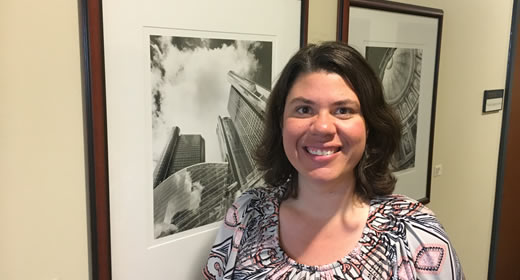
With bias and misinformation swirling around the consequences of wind turbine installation, local government officials are hard-pressed to find reliable information for themselves and their communities. Certainly there are tangible benefits—increased tax revenue, renewable energy, etc—but community concerns with noise pollution and unsightly wind turbines often nullify such profits. Officials are then left wondering about the right course of action.
Fortunately, the Ford School’s Sarah Mills often provides the guidance such officials desperately need. Featured in the Michigan Impact video series “This is Michigan,” Sarah Mills said that her primary goals is to provide government officials with the data and facts regarding the impact of wind energy. The lion’s share of Mills’ work, she says, is to “go around the state and talk to communities who are considering wind development about the pros and cons.”
Unlike a Google search that brings an onslaught of information, Mills strives to “provide…a neutral voice with information specific to Michigan.”
Regardless of her personal preference, Mills admits that “Wind turbines fit better in some communities than others. It depends on what their development goals are.” According to Mills, for rural areas focused on bolstering agricultural production, “wind energy gives them additional income.” Other areas, however, that stress “tourism or have more housing development” may not be suitable for wind turbine installations.
After working with Chandler Township (which has since constructed 87 wind turbines and has started to experience the benefits), both Huron and Greenwood Townships have sought Mills’ insightful counsel. Happy to be of service, Mills expressed how “It has been so uplifting to hear, ‘We’re so glad that the University of Michigan is bringing the kind of research that goes on on campus to rural communities.’”
To watch the “This is Michigan” video and read the Michigan News story, click here.
Sarah Mills is a Senior Project Manager at the Ford School's Center for Local, State, and Urban Policy (CLOSUP). She serves as project manager for the National Surveys on Energy and Environment (NSEE) and the Center's Energy and Environmental Policy Initiative.